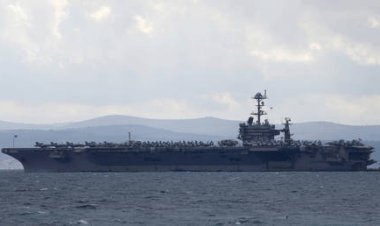Leo becomes the first American pope, seemingly in conflict with the 'America First' ideology.
Steve Bannon referred to Leo as the “worst pick for MAGA Catholics.”
However, the landscape is expected to shift now that Catholic Cardinals have chosen an American—Robert Prevost, the first pope from the U.S.—to lead the Church. His worldview appears to conflict with the "America First" ethos.
Selected on just the second day of voting, Pope Leo could emerge as a global counterweight to Trump, possessing the domestic credibility to influence Catholic Republicans more effectively than his predecessor while also delivering a resonant message in the U.S.
Following the announcement, Trump quickly expressed his approval of Pope Leo, who has spent much of his adult life in Peru, and indicated he looks forward to meeting him.
“It is such an honor to realize that he is the first American Pope. What excitement, and what a Great Honor for our Country. I look forward to meeting Pope Leo XIV. It will be a very meaningful moment!” Trump shared on Truth Social.
Anticipating future tensions, it’s apparent that Leo, like Francis, represents a more progressive and inclusive strand of Catholicism. His initial address from the balcony of St. Peter’s Basilica emphasized peace and the importance of building connections, although he seems to maintain traditional Catholic stances on LGBTQ+ matters.
Conservative Catholics in Washington, D.C., have begun reacting to Leo's selection, sharing messages on social media that point to an account purportedly associated with him that criticized Trump and Vice President JD Vance. PMG has not independently verified this account, and requests for comments from the Vatican and relevant dioceses have gone unanswered.
The rationale behind the cardinals' decision to elect an American pope may remain a mystery, but Leo’s selection arrives at a time when the U.S.’s global standing is increasingly uncertain. The country has reduced foreign aid and appears increasingly reluctant to engage in international conflicts.
“The fact that he's American raises the possibility that the front-and-center issues are going to continue to be sort of first-world issues — and that could be, again, a recipe for division and tension with the administration,” remarked Ramesh Ponnuru, a conservative commentator and practicing Catholic.
Leo's citizenship may provide him a certain rapport with Trump and the potential authority to offer critiques from a perspective that Francis, originally from Argentina, might not have had.
“I don't know that, substantively, the new pope is going to be different in terms of he's still going to say we have to take care of the poor, obviously, as he should. But it might not have that same kind of sweeping character of condemnation that we sometimes got from Francis” due to Leo's American roots, Ponnuru added.
Observers of the Catholic Church suggest that Leo could adopt a more measured approach compared to the often outspoken Francis, who recently had disagreements with Vance regarding theological perspectives on love.
Leo's selection also coincides with a crucial moment for the Catholic Church, which has seen a leftward drift in leadership even as attendance among U.S. Catholics has begun favoring more conservative viewpoints. There has been a rising interest in traditional Catholicism among attendees, who refer to themselves as “trad caths,” and who prefer Latin mass while opposing what they see as a modernist trend within the Church.
“One of the president’s most prominent Catholic allies, Steve Bannon, called Leo the “worst pick for MAGA Catholics,” deeming him the “anti-Trump pope.”
“This is an anti-Trump vote by the globalists that run the Curia — this is the pope Bergoglio and his clique wanted,” Bannon commented, using Pope Francis's birth name, Jorge Mario Bergoglio.
In a bid to influence the cardinals, a faction of hard-line conservative Catholics campaigned for a pope with more conservative views. Notable hard-right candidates included Athanasius Schneider, a bishop in Kazakhstan who characterized refugee influxes in Europe as a “mass invasion,” and American Cardinal Raymond Burke, who openly supported Trump.
Not all Trump supporters reacted negatively to the news, however. MAGA influencer Charlie Kirk suggested he had discovered a tracking file indicating the pope's Republican ties, a claim PMG has not been able to independently verify. Other conservative figures, including commentator Hugh Hewitt, expressed optimism about an American holding such a prominent religious leadership role.
Additionally, Trump, who enjoys the grandeur of major events, is likely genuinely interested in the new pope.
The former president has recently strengthened his connections with Catholic voters, having secured 59 percent support during the 2024 election. This is an increase from 50 percent in 2016 and a slight decrease from Biden’s 52 percent in 2020, according to CNN exit polling. Vance is also only the second Catholic to hold the office after Biden, and Trump's Cabinet is notably filled with Catholic officials. Despite past tensions with Francis, Trump made a notable visit to Rome recently to attend the late pope's funeral, shortly after Vance had a private audience with him.
It remains uncertain if Trump’s favorable sentiments about Catholicism will extend to the new papacy; however, he has suggested that his attendance at Francis’ funeral was partly due to his success with Catholic voters. Recently, Trump has playfully noted his desire to be the next pope, even sharing a whimsically altered image of himself in papal robes on Truth Social, a gesture met with mixed reactions among Catholics.
In a post on X, Vance conveyed only good wishes for Pope Leo.
“I’m sure millions of American Catholics and other Christians will pray for his successful work leading the Church. May God bless him!” Vance expressed.
Emily Johnson for TROIB News












